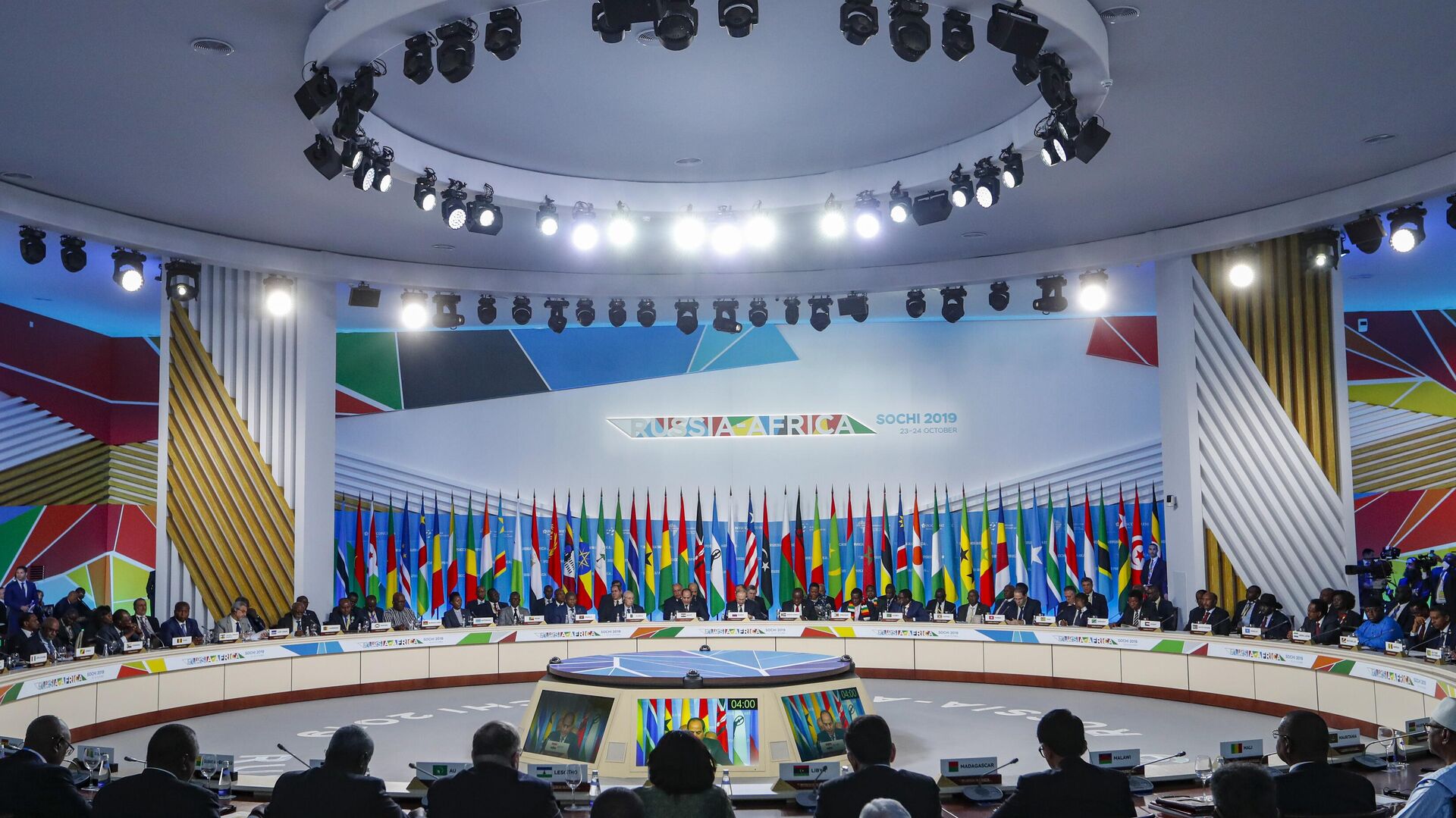https://sputnikglobe.com/20240827/us-containment-strategy-against-russia-failing-amid-emergence-of-multipolar-world-1119921060.html
US Containment Strategy Against Russia Failing Amid Emergence of Multipolar World
US Containment Strategy Against Russia Failing Amid Emergence of Multipolar World
Sputnik International
The US and its Western partners have sought to pursue a containment strategy against the emergent counter-hegemonic bloc anchored by Russia, but with far less success than during the Cold War, argues political science professor Nicolai Petro.
2024-08-27T05:26+0000
2024-08-27T05:26+0000
2024-08-27T05:26+0000
nicolai petro
henry kissinger
russia
soviet union
china
university of rhode island
containment
containment doctrine
containment of russia
cold war
https://cdn1.img.sputnikglobe.com/img/07e8/08/1b/1119921348_0:97:3295:1950_1920x0_80_0_0_2776dbb030030f5a02465bada3ef1630.jpg
Containment was the famous term for the United States’ foreign policy, chiefly in regard to Russia, from the late 1940s until the end of the Cold War. The geopolitical strategy was intended to counter Russia by preventing the spread of friendly communist governments around the world and seeking to roll back and replace such regimes where possible. By starving the newly formed Soviet Union of allies the US hoped to undermine Russia itself, defeating the ideological threat posed by its socioeconomic system.The US and its Western partners have sought to pursue a similar strategy presently against the emergent counter-hegemonic bloc anchored by Russia, but with far less success, argues political science professor Nicolai Petro. Petro joined Sputnik’s The Critical Hour program Monday to address the issue, discussing his new piece The Folly of a New Containment.“And the old containment had its problems, but it held together because it was limited in scope,” he continued. “It didn't actually seek to confront the Soviet Union everywhere at the same time. And, very importantly, it also sought to separate China from the Soviet Union and it would never have worked – Henry Kissinger spoke about this – it would never have been implementable had China and Russia been united against the United States. And, of course, that's the situation we're facing today.”Russia and China have become diplomatically close in the last several years after gradually strengthening ties under Chinese leader Xi Jinping. The two countries declared a “no limits” partnership in February 2022 and have maintained close economic ties, to the consternation of the United States, since Russian President Vladimir Putin launched his special military operation against the Ukraine regime later that month.The strong Russo-China friendship has stymied US attempts to undermine both countries, which are viewed as a threat to continued American hegemony. But Petro argued that the underlying rationale for containment 2.0 is also less strong. Whereas Western hostility against the Soviet Union could be explained in terms of a global battle versus communism, the United States now appears antagonistic toward the existence of the Russian state itself.Western bellicosity has naturally provoked a patriotic response from average Russians.The modern economic situation for the US is also far more challenging, Petro acknowledged. The United States emerged from World War II almost unscathed, leaving it in a position to benefit from the reconstruction of Europe. But “the halcyon days of the 1950s and 60s” are long gone, he noted.“Any new containment policy involves an arms race,” said Petro. “Can we afford an arms race now? I mean, we are a country that has a $35 trillion deficit and no prospect of reducing that significantly in the future.”
https://sputnikglobe.com/20240725/bidens-bitter-legacy-signals-culmination-of-betrayal-of-post-cold-war-hopes-for-peace-1119505408.html
https://sputnikglobe.com/20231203/kissinger--the-americas-how-the-us-built-order-on-the-ashes-of-genocide-1115362379.html
russia
soviet union
china
Sputnik International
feedback@sputniknews.com
+74956456601
MIA „Rossiya Segodnya“
2024
John Miles
https://cdn1.img.sputnikglobe.com/img/07e8/01/19/1116388787_0:0:1316:1316_100x100_80_0_0_77e70d36afd983012b1c5d38ddb84156.jpg
John Miles
https://cdn1.img.sputnikglobe.com/img/07e8/01/19/1116388787_0:0:1316:1316_100x100_80_0_0_77e70d36afd983012b1c5d38ddb84156.jpg
News
en_EN
Sputnik International
feedback@sputniknews.com
+74956456601
MIA „Rossiya Segodnya“
Sputnik International
feedback@sputniknews.com
+74956456601
MIA „Rossiya Segodnya“
John Miles
https://cdn1.img.sputnikglobe.com/img/07e8/01/19/1116388787_0:0:1316:1316_100x100_80_0_0_77e70d36afd983012b1c5d38ddb84156.jpg
us russia containment, us cold war containment, us containment strategy, multipolar world, unipolar world, us hegemony, nato countries, developing nation, russian economy, us-russia war, cold war, us deterrence, russia deterrence, deterrence strategy, containment strategy
us russia containment, us cold war containment, us containment strategy, multipolar world, unipolar world, us hegemony, nato countries, developing nation, russian economy, us-russia war, cold war, us deterrence, russia deterrence, deterrence strategy, containment strategy
US Containment Strategy Against Russia Failing Amid Emergence of Multipolar World
The United States faces economic and geopolitical challenges in successfully implementing the kind of containment strategy it successfully pursued during the Cold War.
Containment was the famous term for the United States’ foreign policy, chiefly in regard to Russia, from the late 1940s until the end of the Cold War. The geopolitical strategy was intended to counter Russia by preventing the spread of friendly communist governments around the world and seeking to roll back and replace such regimes where possible. By starving the newly formed Soviet Union of allies the US hoped to undermine Russia itself, defeating the ideological threat posed by its socioeconomic system.
The US and its Western partners have sought to pursue a similar strategy presently against the emergent counter-hegemonic bloc anchored by Russia, but with far less success, argues political science professor Nicolai Petro. Petro joined
Sputnik’s The Critical Hour program Monday to address the issue, discussing his new
piece The Folly of a New Containment.
“My co-author and I argue that containment doesn't match the challenges that the United States is facing in the future,” said Petro, who teaches at the University of Rhode Island. “It's just an old way of thinking about the world's problems based on strengths that the United States no longer has in the world.”
“And the old containment had its problems, but it held together because it was limited in scope,” he continued. “It didn't actually seek to confront the Soviet Union everywhere at the same time. And, very importantly, it also sought to separate China from the Soviet Union and it would never have worked – Henry Kissinger spoke about this – it would never have been implementable had China and Russia been united against the United States. And, of course, that's the situation we're facing today.”
Russia and China have become diplomatically close in the last several years after gradually strengthening ties under Chinese leader Xi Jinping. The two countries declared a “no limits” partnership in February 2022 and have maintained close economic ties, to the consternation of the United States, since Russian President Vladimir Putin launched his special military operation against the Ukraine regime later that month.
The strong Russo-China friendship has stymied US attempts to undermine both countries, which are viewed as a threat to continued American hegemony. But Petro argued that the underlying rationale for containment 2.0 is also less strong. Whereas Western hostility against the Soviet Union could be explained in terms of a global battle versus communism, the United States now appears antagonistic toward the existence of the Russian state itself.
Western bellicosity has naturally provoked a patriotic response from average Russians.
“It really doesn't leave anything positive or any positive role for a future Russia in the world,” said Petro of modern attempts to pursue a containment strategy. “That's why I think it really doesn't address the needs of the United States. And I think most countries around the world also see it that way.”
The modern economic situation for the US is also far more challenging, Petro acknowledged. The United States emerged from World War II almost unscathed, leaving it in a position to benefit from the reconstruction of Europe. But “the halcyon days of the 1950s and 60s” are long gone, he noted.

3 December 2023, 17:24 GMT
“Any new containment policy involves an arms race,” said Petro. “Can we afford an arms race now? I mean, we are a country that has a $35 trillion deficit and no prospect of reducing that significantly in the future.”
“So it is, as you point out, a very different situation from a growing economy that did not have that indebtedness after World War II, or that eventually rebalanced itself after the debt that the United States incurred during World War II because of substantial growth. But there are no such growth prospects for the United States today.”







